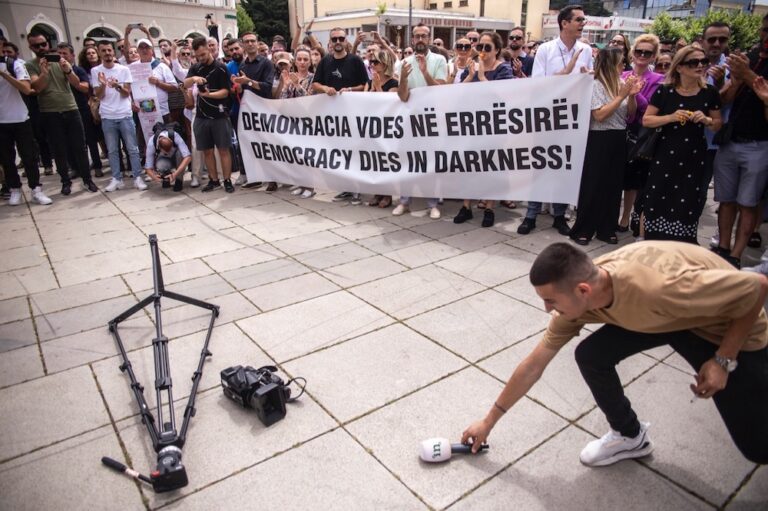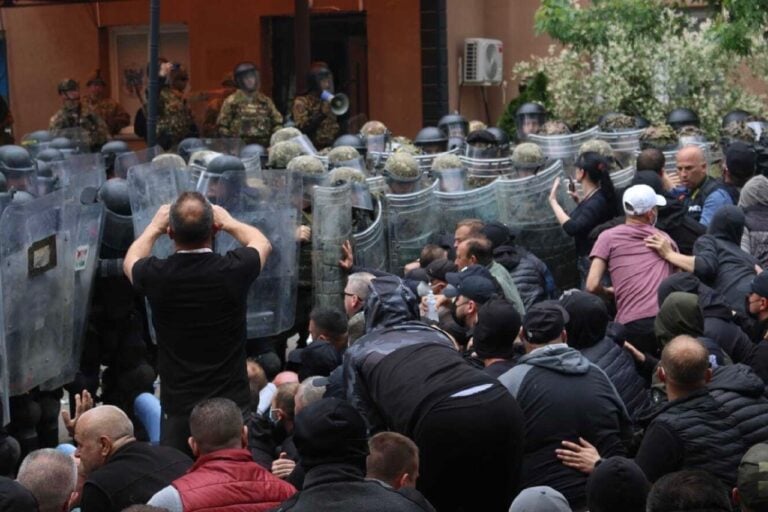Press freedom delegation to Kosovo finds that significant progress has been made in strengthening media freedom. However, journalists still find themselves the targets of SLAPPs and smear campaigns that could increase the risk to their safety.
This statement was originally published on rsf.org on 17 November 2022.
RSF and other international media freedom and journalists’ organisations warn that while significant progress has been made by the current government in depoliticising the public broadcaster, regulatory bodies and the legislative framework for the media environment, toxic rhetoric and smear campaigns against media, underfunding of the public broadcaster and a lack of transparency risk undermining the progress.
Following a two-day fact-finding mission to Prishtina on 15-16 November 2022, the partners of the Council of Europe’s Platform on the Safety of Journalists today publish their findings on media freedom and the safety of journalists in Kosovo.
During the visit the organisations met with the journalist association, editors and journalists, ministers and government officials, judicial authorities, police, representatives of the parliamentary media committee, regulatory bodies, the privacy and information agency and the public broadcaster.
Our assessment is that overall Kosovo continues to have a vibrant and pluralistic media environment. Significant progress has been made in recent years in strengthening the legal framework, which is mostly in line with European and international standards and contains strong constitutional safeguards.
Positive developments include the process of depoliticisation of the public broadcaster Radio Television of Kosovo (RTK) by the Kosovo Assembly via the appointment of new members of the board in a transparent, and merit-based selection process. Initial steps towards improving the functional independence of the Independent Media Commission (IMC) through professional appointments are also welcome.
At the judicial level, a new strategic action plan on prioritisation of cases involving journalists is also a positive development, as is the extension of free legal aid to journalists and media workers. Information the delegation received about training for prosecutors, judges, lawyers and police aimed at handling cases involving journalists and media in line with Council of Europe standards is welcome.
Our organisations commend the government of Kosovo for its concrete action to provide shelter for Ukrainian journalists in exile as part of the Journalists-in-Residence program, which serves as a model of solidarity for other European countries to follow.
During the mission, media stakeholders expressed a high level of trust in the work of the Information and Privacy Agency and its Commissioner, who is overseeing the implementation of the legal framework on access to information and data protection.
All stakeholders the delegation met during the visit expressed an openness to cooperate more closely with the Council of Europe’s Platform for the Safety of Journalists to enhance public authorities’ accountability and benefit from international best practices.
Despite significant progress in these areas, the safety of journalists and impunity for crimes against journalists continue to pose challenges for the overall media freedom landscape. While physical assaults remain rare, serious threats were documented in the last year by the Association of Journalists of Kosovo. The judicial process in criminal and civil cases remains slow and journalists expressed concern over the lack of prosecutions.
Media representatives noted as a particular concern that divisive rhetoric and smear campaigns directed at journalists by some politicians and public officials, including from the governing party, are creating a growing climate of hostility against the media. They said these verbal attacks and attempts by political figures to divide the journalistic community, or portray certain media as political actors, could lead to threats, online harassment and physical violence.
The safety of all journalists reporting on developments in northern Kosovo is an area of serious concern. Access to documents and information in the Serbian language is challenging. Engrained impunity for the disappeared and murdered journalists between 1998 and 2005 must be tackled. While the delegation heard high-level commitments from prosecution to continue these investigations, no evidence of meaningful progress in these cases was presented.
Despite positive reforms in independent governance, the public broadcaster RTK lacks a sustainable financing model. Annual funding was cut in the previous year and is currently at its lowest point in a decade, which is undermining the ability of the public broadcaster to meet programming requirements and ensure the public broadcaster can fulfill its public service mission. Long-awaited amendments to the Law on the Radio and Television of Kosovo remain stalled.
In the field of media regulation, the delegation heard serious concerns about the process of the upcoming recruitment of the remaining members of the IMC by the National Assembly. If conducted non transparently, this would undermine the previous appointment process and severely harm public trust in the institution.
During the mission, media representatives expressed growing concern over the deteriorating climate for transparency and access to information under the current government. Journalists noted in particular a lack of options for communication with officials or the ability to regularly question ministers and the prime minister at press conferences. Media stakeholders also described a lack of political will to foster a climate of transparent governance in relation to media. Appeals to the Information and Privacy Agency over the refusal or inability of public bodies to provide access to public documents have increased significantly in 2022.
The delegation also notes that while defamation is decriminalised, strategic lawsuits against public participation (SLAPPs) against media and journalists continue to pose a serious threat to independent media. We welcome the commitment of the Minister of Justice to take measures to implement international standards on Anti-SLAPP.
The delegation was composed of representatives from ARTICLE 19, the Committee to Protect Journalists, the European Broadcasting Union, the European Centre for Press and Media Freedom, the European Federation of Journalists, the International Press Institute and Reporters Without Borders.



